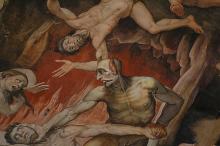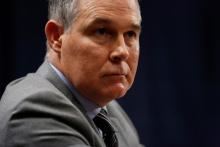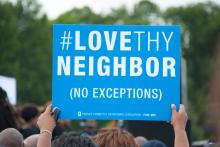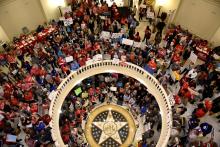Opinion

Sometimes, the film tells us, there are no good answers. All we can do is sit with our thoughts and do our best to love each other well.

Some tried-and-true ideas for Earth Day Sunday celebrations include planning an Earth Day themed worship service, having bulletin inserts or handouts for congregation members, and inviting guest speakers with relevant expertise.

Some theologians taught that eventually all evil human beings and even Satan himself would be restored to unity with God. Other teachers held that hell was an “intermediate state,” where some souls would be purified and others annihilated.

While we look out over creation, we must earnestly ask ourselves how we can participate in communion with the lands surrounding us if there is no clean water to drink, food to eat, or creation in which to delight.

Many people of faith want to follow the imperatives of Scripture, to care for the poor and marginalized, to work against systems of oppression and to build up generosity, rather than wealth. And the needs of the world and of our neighbors are more urgent than ever.

I just met with the three children of Martin Luther King Jr. on a number of occasions over a two-year period and eventually they decided themselves to resolve their differences, which had existed only in court with lawsuits against each other.
1. The Rules of the Asian Body in America
“The story of the Asian body in America is a story about rules, money, race, and imperialism.”
2. One Year Later, Fewer Deportations in Cities That Adopted 'Welcoming' Policies
When local governments collaborate with ICE, deportations increase—in some places, more than 75 percent. But New Mexico shows a different way.

That opportunity to root ourselves in faith and community is what The Summit is all about, this year and every year. It’s why we need you to join us, and to tell us which other leaders need to be there, too.

April 12 marks Holocaust Remembrance Day. Each year communities and schools plan various events such as reading the names of Holocaust victims and survivors, forums of Holocaust survivor speakers, or panel discussions with historians. These events run through an entire week of remembrance.

“This is how the world is meant to be.” That’s what Randall Wright, director of the exceptionally powerful new feature-length documentary Summer in the Forest, said he thought the first time he visited one of the L’Arche communities founded by Jean Vanier that are the subject of his film.

That the morally bankrupt Trump would overlook the ethical improprieties of Pruitt is a surprise to no one. But what’s the excuse for evangelicals? How do #NeverTrump evangelical voices have nothing to say about the glaring ethical breaches of their pal, Scott Pruitt?

The Netflix documentary Wild Wild Country has revived interest in the “free-love cult” founded by Indian guru Rajneesh, or “Osho,” that in 1984 launched a “bioterror attack,” spreading salmonella in restaurants near the group’s Oregon headquarters.

Eight years separate me from that fateful Cru retreat, and if I could go back in time with the voice I have found, I would ask the leader to instruct us in how to be disciples of Christ not for the sake of an imaginary spouse, but for the sake of the Gospel.

The sacred space of the mind in black men and women in 2018 must be reclaimed, reexamined, recalibrated, and reignited for the fight that is ours.

Another reason for a lack of diversity in church leadership is that Mormonism’s growth outside the white communities of the United States and Europe was for a long time sporadic. Until 1978, the church did not allow black members to hold priesthood or worship in temples, rites required for priestly leadership in the church.

My obsessive inner nerd rose to attention. You couldn’t have seen resurrection in Jesus Christ Superstar because there was no resurrection in Jesus Christ Superstar. That was the point! [I online shouted.] That’s why some considered it scandalous — a very human Jesus, a Judas who makes a lot of sense if you listen to him, and no Jesus rising from the dead. It doesn’t deny the resurrection. It just stops beforehand

While Christian witness doesn't mean necessarily going into seminary, Waggoner and Perry have both found, in pastoral training, their voices for this time.

At the time, authors like conservative political activists Tim and Beverly LaHaye and Focus on the Family founder James Dobson acknowledged that porn was a problem that Christians (almost always men but on occasion women) faced. Their writing focused on how pornography harmed marital relationships and personal well-being. At the same time, however, it described how devout Christians may be pornography consumers.

On Monday, April 2 the teacher walkout in Oklahoma began. How did we get to this point and what role does faith play in what is going on here?

Rather than setting Babette’s culinary art and the villagers’ religious commitments in conflict, as if the ambitions of the spirit now succumb to the desires of the flesh, the play links the townspeople’s devotion and Babette’s art as necessary companions. They are more alive for receiving the gift, and Babette is the more beautiful for being allowed her generosity.